
Bajram Curri was an Albanian chieftain, politician and activist who struggled for the independence of Albania, later struggling for Kosovo's incorporation into it following the 1913 Treaty of London. He was posthumously given the title Hero of Albania.
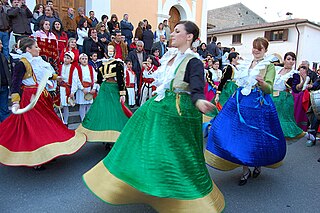
Albanology, also known as Albanian studies, is an interdisciplinary branch of the humanities that addresses the language, costume, literature, art, culture and history of Albanians. Within the studies the scientific methods of literature, linguistics, archeology, history and culture are used. However the Albanian language is the main point of research of the studies.

Mehdi Bardhi was a Kosovar linguist, author, and teacher.
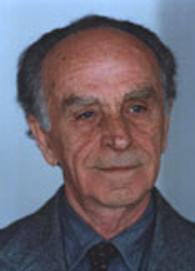
Besim Bokshi was an Albanian poet, linguist and philologist. He served as the president of the Academy of Sciences and Arts of Kosovo during 2008-2011.
The Song of Marko Boçari from Suli is an Albanian polyphonic song of the early 19th century, narrating the death of Markos Botsaris, a Souliot leader.

As of December 2012 Pristina, the capital city of Kosovo, had a population of 205,133 registered inhabitants.

The National Library of Kosovo is the highest library institution in Kosovo established by the Assembly and is located in Pristina.

Studime Historike is a scientific magazine on albanology. It is published by the Institute of History, part of the Centre of Albanological Studies in Tirana, Albania.
It is profilised as a bulletin short studies or articles dealing with Albanian history, from antiquity to nowadays. Beside historical thematic, it publishes studies presented in scientific events as conferences and symposiums, archival documents, pieces of historical memoirs and materials, information of scientific activities organised by the Institute of History, etc.
It provides information of latest publications of the Albanian Institute of History, both Albanian and foreign albanologists.
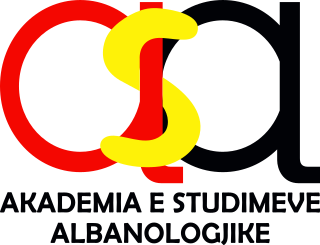
The Academy of Albanological Studies is the main institution of albanology in Albania.
Sabit Uka was a Kosovar Albanian author and noted historian.
Zenel Bastari or Zenel Hyka was an Albanian poet of the Bejtexhinj literary movement. A native of Tirana, he lived and worked from the end of 18th century until mid 19th century. Together with Hasan Zyko Kamberi and Nezim Frakulla he was part of the Bejtexhinj who focused on social and political criticism rather than Islamic moral and life. A precursor of the bourgeois critical-realism, he is also considered one of the first anti-feudal writers in Albania.

Studime Filologjike is a scientific magazine on Albanian language and literature, published by the Centre of Albanological Studies. It publishes linguistics studies, literary historical studies, old texts, resumes of scientific work on literature criticism and linguistics, etc.

Gjuha Jonë is a magazine published in Tirana, Albania, focusing on the standard and literary Albanian language. It is published by the Centre of Albanological Studies. Its main functions consist of enlarging the functionality of the standard Albanian language and elevation of its social prestige, the educational system and staff, strategies on augmentation of press organs and publishing media, and increase of the researchers in the linguistics field.

Albanological Institute of Pristina, Albanian: Instituti Albanologjik i Prishtinës or Instituti Albanologjik - Prishtinë, is the main Institute of Albanology in Kosovo. It is an independent public institution. Together with the Centre of Albanological Studies in Tirana, they represent the core scientific research centers on Albanology.
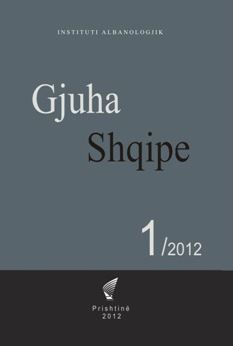
Gjuha Shqipe (Gjuha Shqipe is a scientific magazine published in by the Albanological Institute. It focuses on topics related to the Albanian language, its purification, spread, and development, and possible changes on its standard form.

Studia Albanica is a biannual scientific journal published by the Social and Albanological Studies Section of the Academy of Sciences of Albania. It was established in 1964. It covers Albanology, including studies on the Albanian language and literature, and history. The articles are published in their original language, although French is used by its editorial staff. The editor-in-chief is Seit Mansaku.

The Albanian Orthography Congress was a linguistics event held in Tirana, People's Republic of Albania in 1972. It established for the first time the unified orthographic rules of the Albanian language which are still in use today.
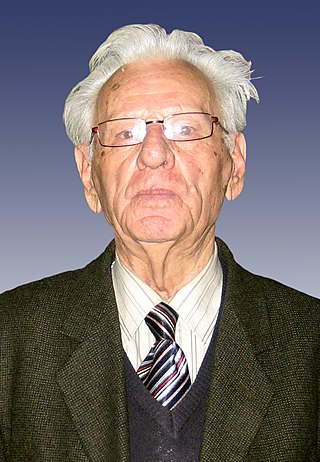
Idriz Ajeti was an Albanologist from Kosovo and one of the main researchers and authorities on the Albanian language studies of post World War II. He was involved for a long period in the academic life of the University of Pristina, and was a member of the Academy of Sciences and Arts of Kosovo, being its chairman for seven years.
Ujmir is a village in Klina municipality, Kosovo. It is located south of the Klina River.
E Bukura e Detit is a character in Albanian mythology and folklore, depicted in some traditions as a sea-fairy / nymph, and in other traditions as a sea goddess, the counterpart of e Bukura e Dheut and i Bukuri i Qiellit. In some Albanian traditions she is regarded as the sister of e Bukura e Dheut.















